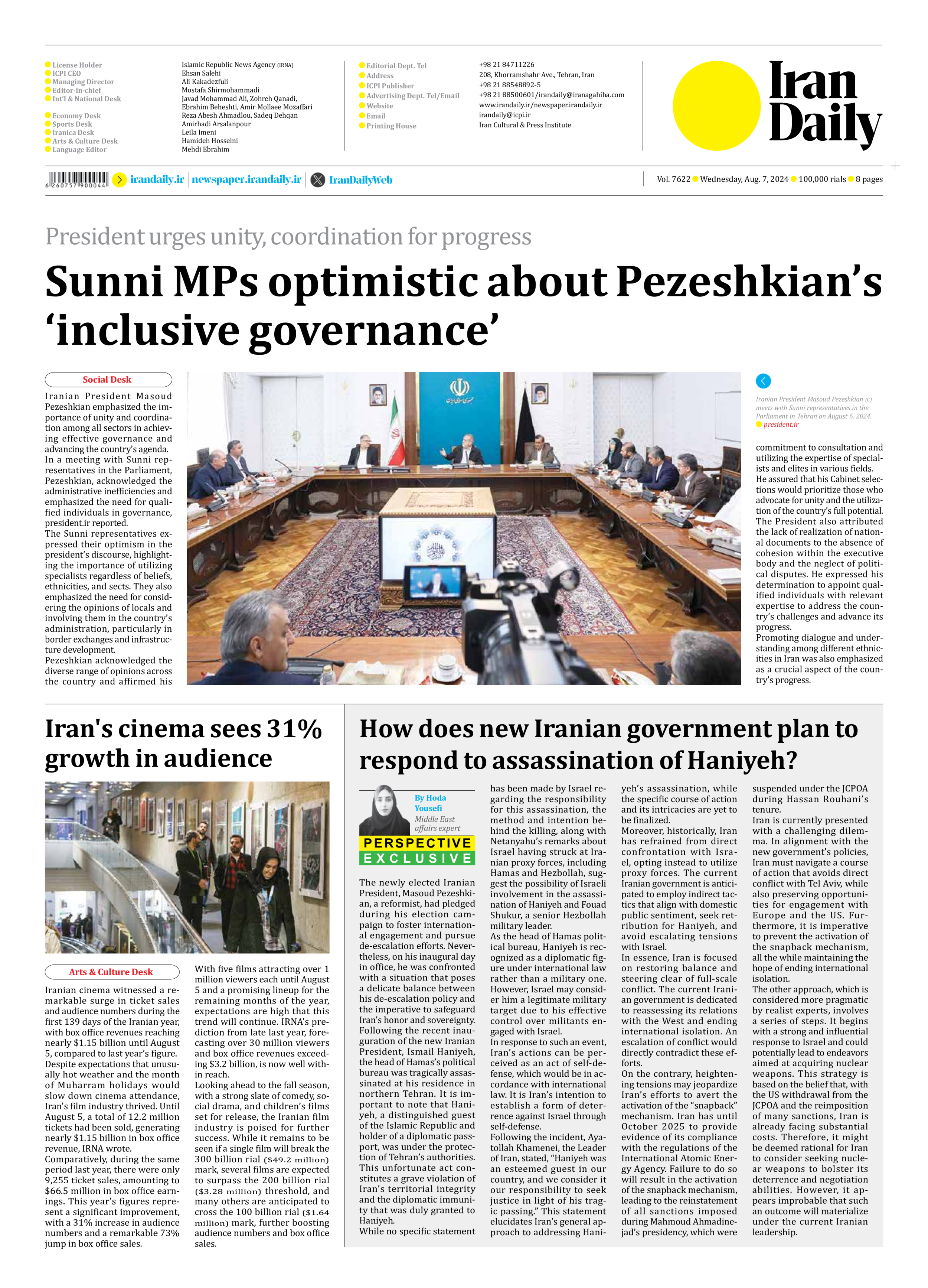
How does new Iranian government plan to respond to assassination of Haniyeh?
By Hoda Yousefi
Middle East affairs expert
The newly elected Iranian President, Masoud Pezeshkian, a reformist, had pledged during his election campaign to foster international engagement and pursue de-escalation efforts. Nevertheless, on his inaugural day in office, he was confronted with a situation that poses a delicate balance between his de-escalation policy and the imperative to safeguard Iran’s honor and sovereignty.
Following the recent inauguration of the new Iranian President, Ismail Haniyeh, the head of Hamas’s political bureau was tragically assassinated at his residence in northern Tehran. It is important to note that Haniyeh, a distinguished guest of the Islamic Republic and holder of a diplomatic passport, was under the protection of Tehran’s authorities. This unfortunate act constitutes a grave violation of Iran’s territorial integrity and the diplomatic immunity that was duly granted to
Haniyeh.
While no specific statement has been made by Israel regarding the responsibility for this assassination, the method and intention behind the killing, along with Netanyahu’s remarks about Israel having struck at Iranian proxy forces, including Hamas and Hezbollah, suggest the possibility of Israeli involvement in the assassination of Haniyeh and Fouad Shukur, a senior Hezbollah military leader.
As the head of Hamas political bureau, Haniyeh is recognized as a diplomatic figure under international law rather than a military one. However, Israel may consider him a legitimate military target due to his effective control over militants engaged with Israel.
In response to such an event, Iran’s actions can be perceived as an act of self-defense, which would be in accordance with international law. It is Iran’s intention to establish a form of deterrence against Israel through self-defense.
Following the incident, Ayatollah Khamenei, the Leader of Iran, stated, “Haniyeh was an esteemed guest in our country, and we consider it our responsibility to seek justice in light of his tragic passing.” This statement elucidates Iran’s general approach to addressing Haniyeh’s assassination, while the specific course of action and its intricacies are yet to be finalized.
Moreover, historically, Iran has refrained from direct confrontation with Israel, opting instead to utilize proxy forces. The current Iranian government is anticipated to employ indirect tactics that align with domestic public sentiment, seek retribution for Haniyeh, and avoid escalating tensions with Israel.
In essence, Iran is focused on restoring balance and steering clear of full-scale conflict. The current Iranian government is dedicated to reassessing its relations with the West and ending international isolation. An escalation of conflict would directly contradict these efforts.
On the contrary, heightening tensions may jeopardize Iran’s efforts to avert the activation of the “snapback” mechanism. Iran has until October 2025 to provide evidence of its compliance with the regulations of the International Atomic Energy Agency. Failure to do so will result in the activation of the snapback mechanism, leading to the reinstatement of all sanctions imposed during Mahmoud Ahmadinejad’s presidency, which were suspended under the JCPOA during Hassan Rouhani’s tenure.
Iran is currently presented with a challenging dilemma. In alignment with the new government’s policies, Iran must navigate a course of action that avoids direct conflict with Tel Aviv, while also preserving opportunities for engagement with Europe and the US. Furthermore, it is imperative to prevent the activation of the snapback mechanism, all the while maintaining the hope of ending international
isolation.
The other approach, which is considered more pragmatic by realist experts, involves a series of steps. It begins with a strong and influential response to Israel and could potentially lead to endeavors aimed at acquiring nuclear weapons. This strategy is based on the belief that, with the US withdrawal from the JCPOA and the reimposition of many sanctions, Iran is already facing substantial costs. Therefore, it might be deemed rational for Iran to consider seeking nuclear weapons to bolster its deterrence and negotiation abilities. However, it appears improbable that such an outcome will materialize under the current Iranian leadership.







